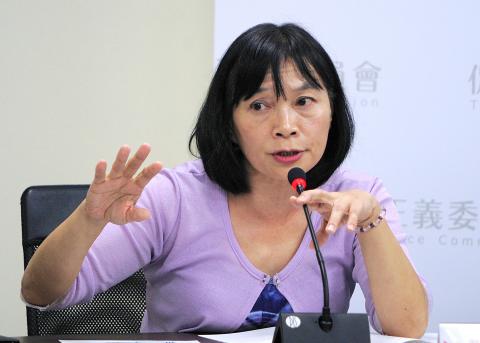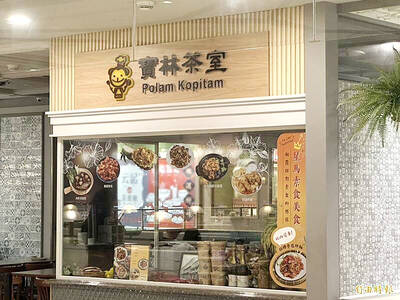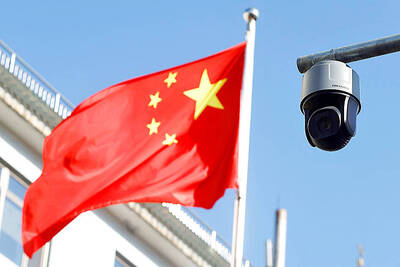A decision about the fate of the Chiang Kai-shek Memorial Hall in Taipei would be made before early next year, Transitional Justice Commission members said yesterday.
The commission would also consider options for transitioning the Cihu Mausoleum (慈湖陵寢), where Chiang Kai-shek (蔣介石) is entombed, they told a news conference in Taipei.
The news conference had been called to announce the dates and locations of three public meetings on implementing transitional justice and a human-rights vision for the nation.

Photo: Wang Yi-song, Taipei Times
While legislation can provide recompense for the financial damages and loss to reputation suffered by victims of the White Terror era, such measures in themselves are not enough to meet the demands of justice, commission Deputy Chairman Chang Tien-chin (張天欽) said.
The commission is dedicated to recovering historical truths, removing authoritarian symbols and healing societal trauma, so it is inviting victims of political persecution or their surviving family members to the public meetings so that it can explain its goals and policies, and to hear their opinions, Chang said.
The first public meeting is to be held tomorrow at the Jingmei Human Rights Memorial and Cultural Park in Taipei’s Xindian District (新店), the commission said.
The second is scheduled for Sept. 16 at the Taichung Cultural and Creative Industries Park and the third will be at the Kaohsiung Municipal Library on Sept. 30.
The Chiang Kai-shek Memorial Hall would “certainly undergo a transition,” which the Ministry of Culture has been preparing for since last year, commission member Yang Tsui (楊翠) said.
The commission would soon begin talks on the specifics, such as uses for the site and what should be down with Chiang’s statute, she said.
The ministry is drafting amendments to the Organization Act of National Chiang Kai-shek Memorial Management Office (國立中正紀念堂管理處組織法), which would lay out the steps regarding those issues, she said.
Asked about commission’s plans for the Cihu Mausoleum, Yang said the mausoleum is “definitely on the commission’s agenda,” but it has not begun discussions about it.
Lan Yun-jo (藍芸若), the daughter of White Terror victim Lan Ming-ku (藍明谷), said it is not right that the persecutors have not been identified or that she had to live with the infamy of being the daughter of an accused communist spy for 70 years.
“My father would have been pleased to visit the memorial parks if they had imprisoned him for a dozen years instead of being shot,” she said. “Many victims are living in the shadow of history and I hope the commission would give us justice.”
Lang Ming-ku, a 32-year-old teacher in Keelung, was arrested in 1951 and executed without trial.

POLAM KOPITIAM CASE: Of the two people still in hospital, one has undergone a liver transplant and is improving, while the other is being evaluated for a liver transplant A fourth person has died from bongkrek acid poisoning linked to the Polam Kopitiam (寶林茶室) restaurant in Taipei’s Far Eastern Sogo Xinyi A13 Department Store, the Ministry of Health and Welfare said yesterday, as two other people remain seriously ill in hospital. The first death was reported on March 24. The man had been 39 years old and had eaten at the restaurant on March 22. As more cases of suspected food poisoning involving people who had eaten at the restaurant were reported by hospitals on March 26, the ministry and the Taipei Department of Health launched an investigation. The Food and

The long-awaited Taichung aquarium is expected to open next year after more than a decade of development. The building in Cingshui District (清水) is to feature a large ocean aquarium on the first floor, coral display area on the second floor, a jellyfish tank and Dajia River (大甲溪) basin display on the third, a river estuary display and restaurant on the fourth, and a cafe and garden on the fifth. As it is near Wuci Fishing Port (梧棲漁港), many are expecting the opening of the aquarium to bring more tourism to the harbor. Speaking at the city council on Monday, Taichung City Councilor

A fourth person has died in a food poisoning outbreak linked to the Xinyi (信義) branch of Malaysian restaurant chain Polam Kopitiam (寶林茶室) in Taipei, Deputy Minister of Health and Welfare Victor Wang (王必勝) said on Monday. It was the second fatality in three days, after another was announced on Saturday. The 40-year-old woman experienced multiple organ failure in the early hours on Monday, and the family decided not to undergo emergency resuscitation, Wang said. She initially showed signs of improvement after seeking medical treatment for nausea, vomiting and diarrhea, but her condition worsened due to an infection, he said. Two others who

Taiwanese should be mindful when visiting China, as Beijing in July is likely to tighten the implementation of policies on national security following the introduction of two regulations, a researcher said on Saturday. China on Friday unveiled the regulations governing the law enforcement and judicial activities of national security agencies. They would help crack down on “illegal” and “criminal” activities that Beijing considers to be endangering national security, according to reports by China’s state media. The definition of what constitutes a national security threat in China is vague, Taiwan Thinktank researcher Wu Se-chih (吳瑟致) said. The two procedural regulations are to provide Chinese